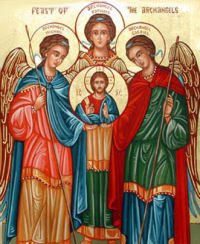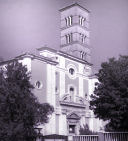Fw: The Daily Gospel
Sancta Maria Abbey: http://www.nunraw.com.uk (Website) Blogspot :http://www.nunraw.blogspot.co.uk, domdonald.org.uk
On Saturday, 27 September 2014, 17:06, DGO <noreply@evzo.org> wrote:
Holy Gospel of Jesus Christ according to Saint Matthew 21:28-32.
Jesus said to the chief priests and the elders of the people: "What is your opinion? A man had two sons. He came to the first and said, 'Son, go out and work in the vineyard today.'
He said in reply, 'I will not,' but afterwards he changed his mind and went.
The man came to the other son and gave the same order. He said in reply, 'Yes, sir,' but did not go.
Which of the two did his father's will?" They answered, "The first." Jesus said to them, "Amen, I say to you, tax collectors and prostitutes are entering the kingdom of God before you.
When John came to you in the way of righteousness, you did not believe him; but tax collectors and prostitutes did. Yet even when you saw that, you did not later change your minds and believe him.
He said in reply, 'I will not,' but afterwards he changed his mind and went.
The man came to the other son and gave the same order. He said in reply, 'Yes, sir,' but did not go.
Which of the two did his father's will?" They answered, "The first." Jesus said to them, "Amen, I say to you, tax collectors and prostitutes are entering the kingdom of God before you.
When John came to you in the way of righteousness, you did not believe him; but tax collectors and prostitutes did. Yet even when you saw that, you did not later change your minds and believe him.
YES AND NO
Homily by Fr. Raymond
In The gospel story today the first son says ‘no’, but does go to work in his father’s vineyard, and the second son says ‘yes’ but doesn’t go to work in his father’s ‘ vineyard. Jesus is obviously comparing the first son with the gentile peoples who at first don’t keep God’s laws but who, on hearing the teaching of Jesus are led to obey their true Father, God. On the other hand he is comparing the original people of God, the Jews, to the second son because they are the first to acknowledge the true God but fail to obey his Messiah when he finally comes. If we are to learn anything from this parable there is not much point in just applying it to the Jews as though it were just a history lesson. We must learn to apply it to ourselves, each and every one of us, in our daily lives. We must realise how often there is this ‘yes and no’ in our own lives as we face so many daily choices between what we know very well to be our duty before God and what is our own convenience in one way or another. To ‘go to the vineyard’ means, for each of us, to do what we well know we ought to do. We say always say ‘yes’ to our conscience and we should always carry out that ‘yes’. It is so easy to put off the execution of our good intentions for a thousand and one reasons, or even for no reason at all. And finally we forget to carry them out altogether. It’s not only for others that we should be true to our word. The first person to whom we owe our sincerity in what we promise is our own selves. The more we let others down, the more we let our own selves down. The more we let others down, the more we lose not only the respect and confidence of others but also our own respect and confidence for ourselves. Trust is one of the most essential elements of human life. The whole of human society is built on trust. Where there is no sense of reliability and trust in others there can only chaos and fear. All commerce is based on it. All education is based on it. Marriage and the family itself are based on it. Our very hope in God is base on it. The very climax of the passion of Christ was not the pain of the scourging and the nails, but the last desperate ploy of Satan to deprive Jesus of his trust in his heavenly Father; a temptation that forced from him that terrible cry of ‘My God my God, why have your forsaken me’. St Paul teaches us that we can always trust the promises of God: Christ is the great ‘Yes’ of God to Mankind.

The following day, Monday 29 September,
Fr. Raymond was Presiding the Mass.
He began the introduction by reciting the Archangel Prayer learned by heart as he knew at the Low Mass some time past. (Pope Leo XIII 1903).
Short Prayer to St. Michael the Archangel
The well-known short version of this prayer follows in English and Latin. The Pope ordered this prayer to be recited daily after Low Mass in all the churches throughout the Catholic world. However this practice was almost completely swept away in the 1960s by liturgical changes made in the wake of Vatican Council II.
Saint Michael the Archangel, defend us in battle, be our protection against the malice and snares of the devil. May God rebuke him we humbly pray; and do thou, O Prince of the Heavenly host, by the power of God, thrust into hell Satan and all evil spirits who wander through the world for the ruin of souls. Amen.
|
Sáncte Míchael Archángele, defénde nos in proélio, cóntra nequítiam et insídias diáboli ésto præsídium. Ímperet ílli Déus, súpplices deprecámur: tuque, prínceps milítiæ cæléstis, Sátanam aliósque spíritus malígnos, qui ad perditiónem animárum pervagántur in múndo, divína virtúte, in inférnum detrúde. Ámen
|
ICN:
Posted: Sunday, September 28, 2014 12:09 am
|
Saint of the day: 29th September
Archangels Michael, Gabriel and Raphael
The name Michael means 'He who is like unto God'. The archangel engages in a great cosmic battle with the Devil. In the Book of Jude, he contends with the Devil over the body of Moses, rebuking the Evil One in God's name. The imagery reveals that with the triumph of Jesus, evil no longer reigns throughout the cosmos, but remains on earth as the enemy of those who seek to follow God's will.
In the New Testament Michael is twice represented as the helper of God's chosen people.
Gabriel (his name means man of God) is an archangel who assists Daniel, helping him to understand his visions. Gabriel has a special role in the New Testament. To Zachariah the father of John the Baptist, he announces the birth of the future prophet. He brings the message to the Virgin Mary that she is to be the Mother of God.
Raphael appears in the Book of Tobit as one of the seven archangels who stand in God's presence. Tobit presents him as hearing our prayers and bring them to God. Raphael means 'God heals'.
All three archangels appear in later Christian writings many times, with Michael often seen as the receiver of souls of the departed - as in the spiritual Michael Row the Boat Ashore.
The name Michael means 'He who is like unto God'. The archangel engages in a great cosmic battle with the Devil. In the Book of Jude, he contends with the Devil over the body of Moses, rebuking the Evil One in God's name. The imagery reveals that with the triumph of Jesus, evil no longer reigns throughout the cosmos, but remains on earth as the enemy of those who seek to follow God's will.
In the New Testament Michael is twice represented as the helper of God's chosen people.
Gabriel (his name means man of God) is an archangel who assists Daniel, helping him to understand his visions. Gabriel has a special role in the New Testament. To Zachariah the father of John the Baptist, he announces the birth of the future prophet. He brings the message to the Virgin Mary that she is to be the Mother of God.
Raphael appears in the Book of Tobit as one of the seven archangels who stand in God's presence. Tobit presents him as hearing our prayers and bring them to God. Raphael means 'God heals'.
All three archangels appear in later Christian writings many times, with Michael often seen as the receiver of souls of the departed - as in the spiritual Michael Row the Boat Ashore.















